MercoPress. South Atlantic News Agency
Tag: devaluation
-
Wednesday, September 5th 2018 - 08:16 UTC
Argentine Peso slid another 2.18% and the Central bank sold US$ 350 million in reserves
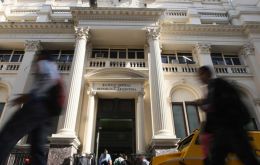
Argentina’s peso slid further on Tuesday as investors reacted with skepticism to president Mauricio Macri’s plans. Many worry he will not be able to push reforms through a restive Congress amid growing frustration on the streets of Buenos Aires.
-
Tuesday, September 4th 2018 - 08:41 UTC
Brazil's Real and Argentina's Peso slumped on Monday
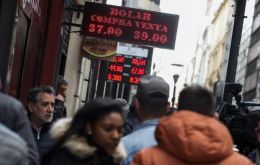
The Brazilian Real slumped on Monday as mounting concerns over this year's presidential election added to global risk aversion, while the Argentine peso extended a recent sell-off that also spread into stock markets in Latin America.
-
Monday, September 3rd 2018 - 19:17 UTC
Macri admits the seriousness of the situation and Dujovne is off to meet with IMF

President Mauricio Macri unveiled plans on Monday to raise export taxes on grains and slash the number of government ministries in a bid to balance its budget next year, as Argentina seeks a deal with the IMF to accelerate a US$ 50 billion standby loan program.
-
Monday, January 29th 2018 - 18:29 UTC
“Electoral charade”: Maduro clings to power at all costs
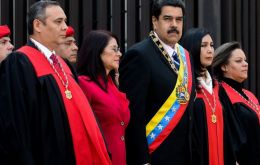
On December 20 the National Constituent Assembly (ANC) - formed only by pro-government officials - decreed that political parties that did not participate for the last regional election a few months ago must be revalidated before the National Electoral Council (CNE), a rule that according to the the current constitution should be should be applied when absenting more than 3 times to the suffrages.
-
Tuesday, January 19th 2016 - 06:47 UTC
Bank of America anticipates strong devaluation for bankrupt Venezuela
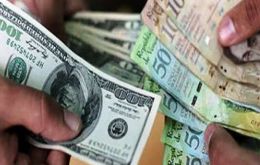
Bank of America predicted president Nicolas Maduro would merge Venezuela’s three-tier currency controls into two, replacing the strongest rate of 6.3 bolivars to the dollar with a level of 35. Greenbacks go for around 865 bolivars on the black market.
-
Wednesday, September 9th 2015 - 07:45 UTC
World Bank calls on the Fed to delay raising rates fearing 'panic and turmoil' in emerging markets
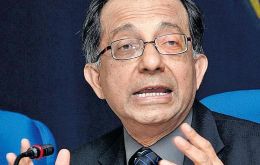
The international economics establishment has stepped up pressure on the Federal Reserve to delay raising interest rates, with the World Bank the latest institution to warn that the US central bank risks sparking “panic and turmoil” in emerging markets if it increases rates next week.
-
Wednesday, September 11th 2013 - 22:02 UTC
”If Brazil devalues, Uruguay will follow”, President Mujica tells farmers

President Jose Mujica said that Uruguay is ‘aligned’ with Brazil in economic policy, and if the government of President Dilma Rousseff decides to devalue its currency, “Uruguay will follow” and as Brazil, “Uruguay is not satisfied with the functioning of Mercosur”.
-
Monday, August 22nd 2011 - 07:01 UTC
Argentina needs ‘no contingency or emergency plan’ to face the crises
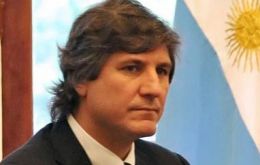
Economy Minister Amado Boudou rejected the possibility that Argentina launches a brusque devaluation of its currency to make exports more competitive and insisted Argentina needs no emergency or contingency plan to face the challenge of the current crisis in the developed economies.
-
Monday, January 3rd 2011 - 05:11 UTC
Venezuelan currency devalued again

Venezuelan government devalued its bolivar currency for the second time in 12 months on Thursday, abolishing the lowest exchange rate as the Opec member fights to revive its economy. Intended to spur local production in the largely import-dependent nation, the announcement followed a central bank estimate that the economy contracted 1.9 percent during 2010 - Venezuela's second straight year of recession.
-
Tuesday, April 27th 2010 - 06:08 UTC
Brazil will Impose Import Levies to Face “Cheap” US Dollar, Unless Accord is Reached

Brazil’s government may take additional steps to limit gains in the local currency Real should advanced economies favor policies that keep their currencies weak, Finance Minister Guido Mantega said.
